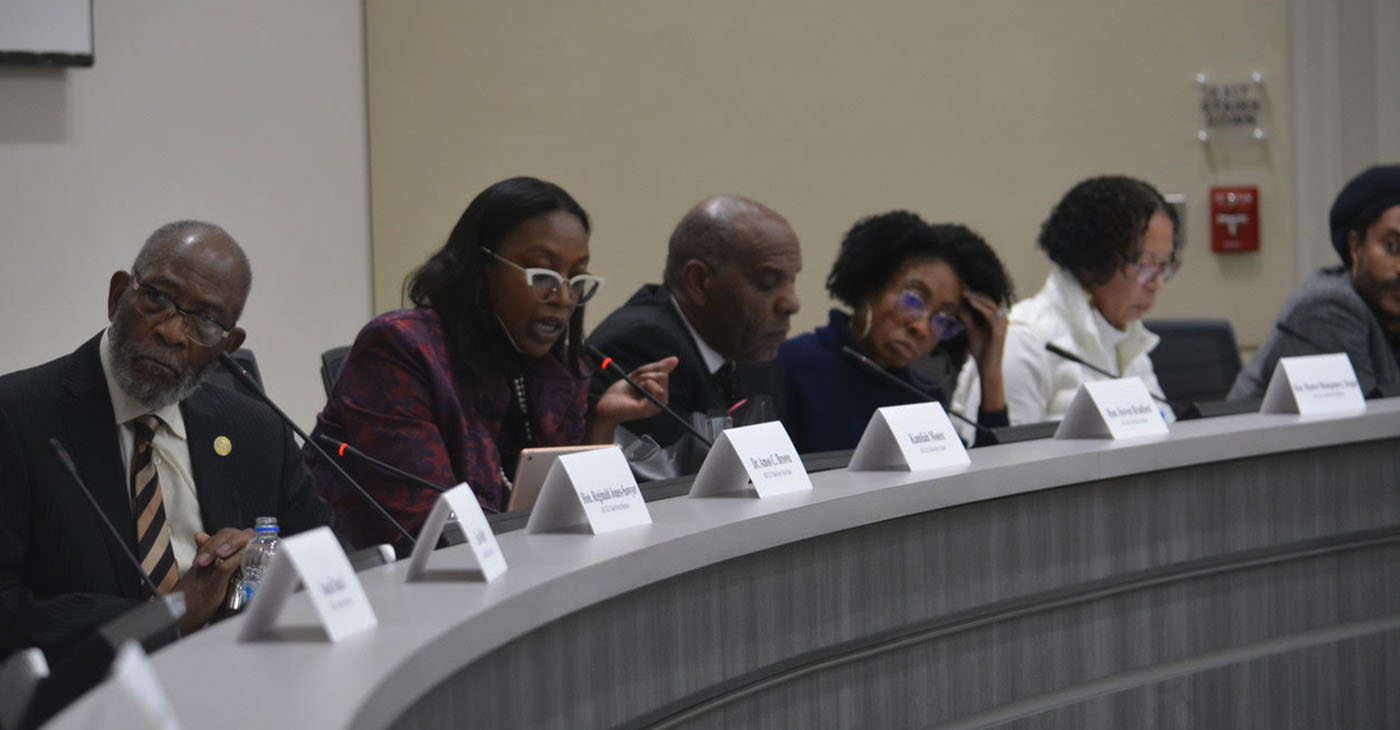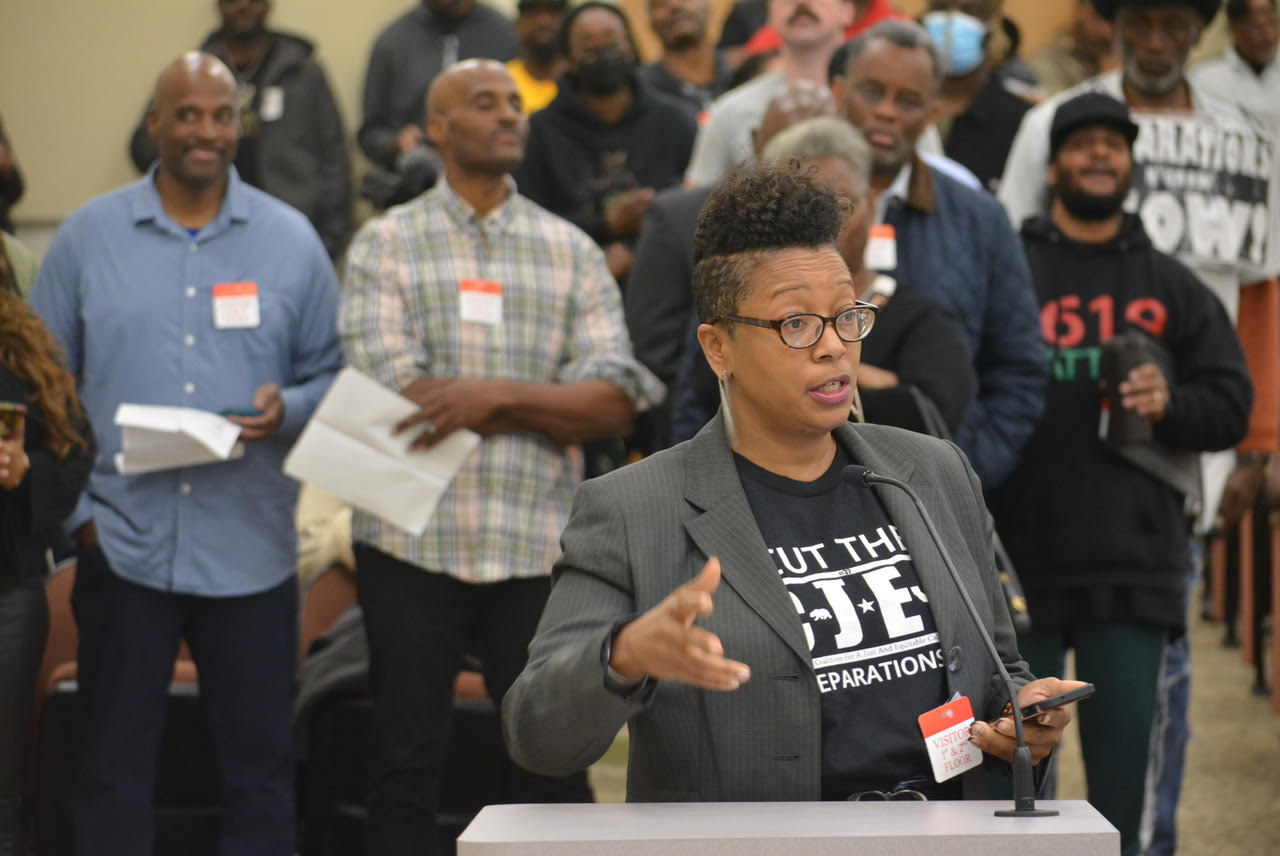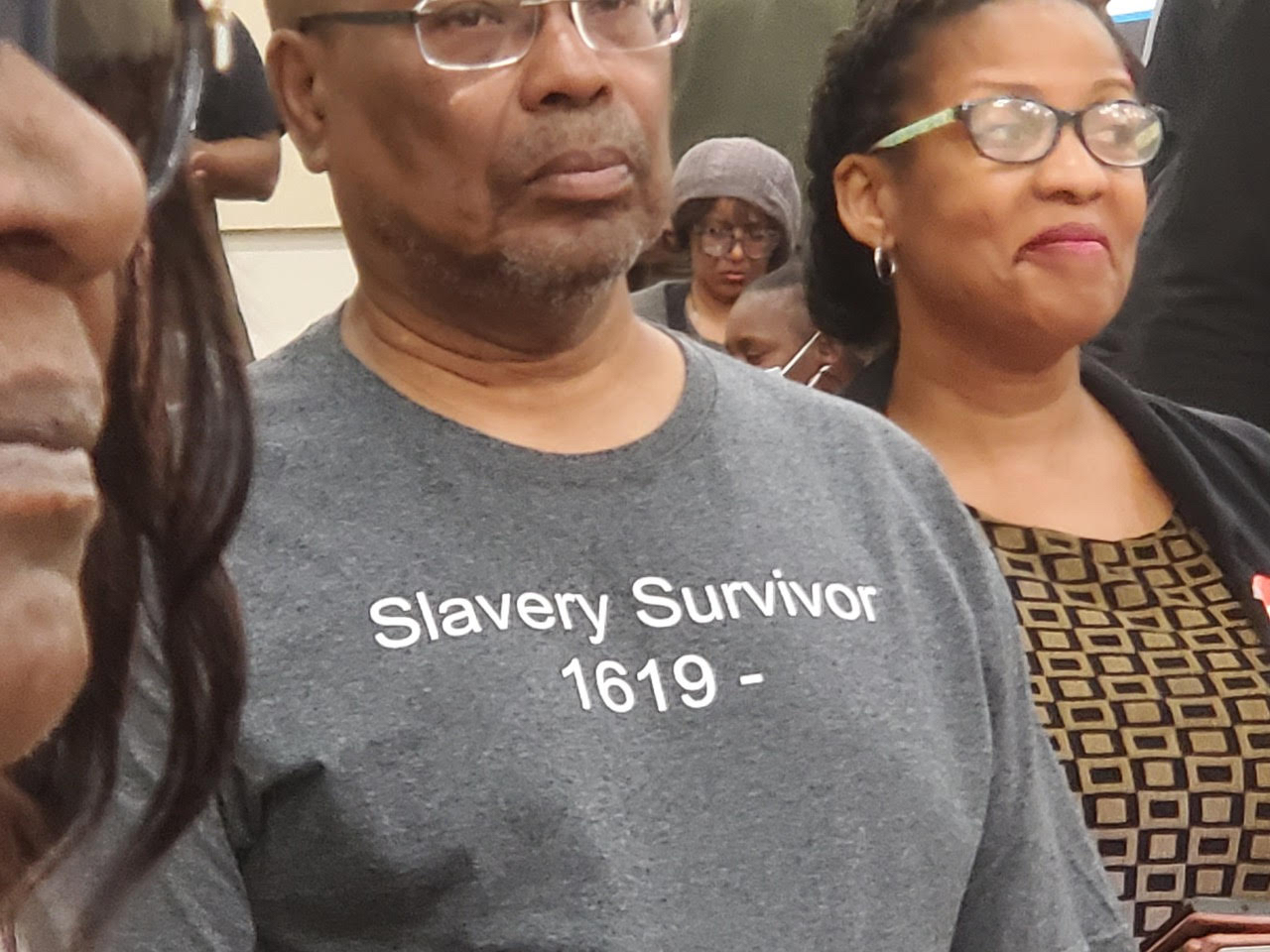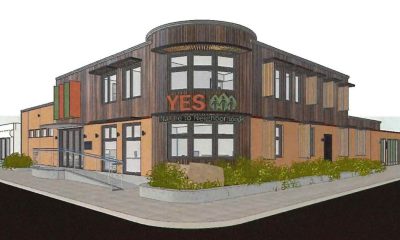Activism
Reparations: California Legislative Analyst’s Office Proposes “Paths” For Payments
This past weekend, the California Task Force to Study and Develop Reparations Proposals for African Americans received insight on how the state government might implement recommendations the panel submits in its final proposal due before July 1.

Antonio Ray Harvey | California Black Media
This past weekend, the California Task Force to Study and Develop Reparations Proposals for African Americans received insight on how the state government might implement recommendations the panel submits in its final proposal due before July 1.
Chas Alamo, the principal fiscal and policy analyst at the California Legislative Analyst’s Office (LAO), appeared remotely in front of the panel as an expert witness during the two-day meeting held March 3 in Sacramento.
Alamo offered “several paths that could be possible for ultimate recommendations” by the task force to “flow through the Legislature and become state law” and how they can “apply” to the creation of the proposed California American Freedman Affairs Agency (CAFAA). The agency, if approved, would oversee compensation the state authorizes to Black California residents who are descendants of enslaved people in the United States.
The LAO is a non-partisan office overseen by the Joint Legislative Budget Committee (JLBC), a 16-member bipartisan team. It is the “eyes and ears” of the State Legislature ensuring that the executive branch is implementing legislative policy in a cost-efficient and effective manner. Its biggest responsibility is analyzing the governor’s annual budget.

Khansa “Friday Jones” Jones-Muhammad, is the vice president of the Los Angeles Reparations Advisory Commission. CBM photo by Antonio Ray Harvey.
Alamo explained to the task force how the recommendations they make will likely become state policy.
“The creation of a new agency would be initiated through the governor’s executive branch and reorganization process, but other options exist,” Alamo said. “Regardless of the path, to initiate a new agency or enact any other recommendation that makes changes to state law, fundamentally both houses from the state Legislature would have to approve the action and the governor will have to sign it.
During discussions at the Sacramento meeting, the task force began the process of clearly defining CAFAA’s role, focusing on adding clarity to the agency’s mission as overseer for other entities offering reparations in the form of assistance to Californians who qualify.
After a two-hour spirited debate at the meeting — the 13th convening of the task force so far — all nine-members agreed that CAFAA would have specified powers and its structure would include an administrative body that guides implementation.
“The proposed entity would be an agency, independent agency, that would provide services where they don’t presently exist (and) provide oversight to existing (state) agencies,” task force chair Kamilah V. Moore said.
CAFAA would facilitate claims for restitution and would set up a branch to process claims with the state and assist claimants in proving eligibility through a “genealogy” department, the task force members said. A commitment to assisting with the implementation and operation of policies and programs being considered for recommendation would also be in the purview of the agency.
The concept of CAFAA is based on the defunct federal Freedmen’s Bureau. On March 3, 1865, Congress passed “An Act to establish a Bureau for the Relief of Freedmen and Refugees.” The bureau’s main objective was to provide food, shelter, clothing, medical services, and land to newly freed African Americans.
Ward Connerly, the African American political activist who led the ballot initiative that outlawed Affirmative Action in California in 1996, Proposition (Prop) 209, told FOX News one day after the task force’s Sacramento meeting that offering reparations was a “bad” and a “goofy idea.”
Connerly, former President of the California Civil Rights Initiative Campaign, has made objections to reparations for about a year now as California gets closer than any government in United States history to making amends for historical injustices committed against Black Americans.
“California is a progressive state but we’re not insane,” Connerly told FOX News on March 5. “So, I think that people of this state would rise up and say ‘no.’”
The two-day meeting in Sacramento was held at the Byron Sher Auditorium at the California Environmental Protection Agency (CalEPA) in downtown Sacramento. Both days attracted crowds, mainly comprised of interested individuals and groups from Southern California and the San Francisco Bay Area.

A participant stands and waits to give public comment at the March 4 Reparations Task Force meeting in Sacramento. CBM photo by Antonio Ray Harvey.
Sacramento Mayor Darrell Steinberg attended the second day of the meeting. Steinberg is one of 11 mayors who pledged to pay reparations for slavery to Black residents in their cities.
Similar to efforts in Los Angeles, Oakland, San Francisco, and Richmond, Sacramento is focused on developing a municipal reparations initiative through the city’s ongoing Sacramento Centered on Racial Equity (SCORE) initiative.
“I wholeheartedly support reparations and think everyone should,” Steinberg told the task force panel on March 4. “If government should stand for anything, it should stand for investing in communities and people who have been the victims of discrimination and disenfranchisement for far too long.”
The task force also recommended “appropriate ways” to educate the public about the task force’s findings and future reparations actions by the state.
The charge calls for building a collective base of knowledge to inform racially diverse communities in California about reparations, appealing to different ways of learning, expanding task force discussions into mainstream conversations, and inspiring reflection and action among all residents of California.
Task force members Dr. Cheryl Grills and Don Tamaki presented the proposal.
The next two-day task force will return to Sacramento at the end of March. For more information on the next meeting, visit the California Department of Justice’s website (https://oag.ca.gov/ab3121).
Activism
Oakland Post: Week of April 24 – 30, 2024
The printed Weekly Edition of the Oakland Post: Week of April 24 – 30, 2024

To enlarge your view of this issue, use the slider, magnifying glass icon or full page icon in the lower right corner of the browser window. ![]()
Activism
Oakland Post: Week of April 17 – 23, 2024
The printed Weekly Edition of the Oakland Post: Week of April 17 – 23, 2024

To enlarge your view of this issue, use the slider, magnifying glass icon or full page icon in the lower right corner of the browser window. ![]()
Activism
Oakland Schools Honor Fred Korematsu Day of Civil Liberties
Every Jan. 30, OUSD commemorates the legacy of Fred Korematsu, an Oakland native, a Castlemont High School graduate, and a national symbol of resistance, resilience, and justice. His defiant stand against racial injustice and his unwavering commitment to civil rights continue to inspire the local community and the nation. Tuesday was “Fred Korematsu Day of Civil Liberties and the Constitution” in the state of California and a growing number of states across the country.

By Post Staff
Every Jan. 30, OUSD commemorates the legacy of Fred Korematsu, an Oakland native, a Castlemont High School graduate, and a national symbol of resistance, resilience, and justice.
His defiant stand against racial injustice and his unwavering commitment to civil rights continue to inspire the local community and the nation. Tuesday was “Fred Korematsu Day of Civil Liberties and the Constitution” in the state of California and a growing number of states across the country.
One OUSD school is named in his honor: Fred T. Korematsu Discovery Academy (KDA) elementary in East Oakland.
Several years ago, founding KDA Principal Charles Wilson, in a video interview with anti-hate organization “Not In Our Town,” said, “We chose the name Fred Korematsu because we really felt like the attributes that he showed in his work are things that the children need to learn … that common people can stand up and make differences in a large number of people’s lives.”
Fred Korematsu was born in Oakland on Jan. 30, 1919. His parents ran a floral nursery business, and his upbringing in Oakland shaped his worldview. His belief in the importance of standing up for your rights and the rights of others, regardless of race or background, was the foundation for his activism against racial prejudice and for the rights of Japanese Americans during World War II.
At the start of the war, Korematsu was turned away from enlisting in the National Guard and the Coast Guard because of his race. He trained as a welder, working at the docks in Oakland, but was fired after the bombing of Pearl Harbor in 1941. Fear and prejudice led to federal Executive Order 9066, which forced more than 120,000 Japanese Americans out of their homes and neighborhoods and into remote internment camps.
The 23-year-old Korematsu resisted the order. He underwent cosmetic surgery and assumed a false identity, choosing freedom over unjust imprisonment. His later arrest and conviction sparked a legal battle that would challenge the foundation of civil liberties in America.
Korematsu’s fight culminated in the Supreme Court’s initial ruling against him in 1944. He spent years in a Utah internment camp with his family, followed by time living in Salt Lake City where he was dogged by racism.
In 1976, President Gerald Ford overturned Executive Order 9066. Seven years later, the 9th Circuit Court of Appeals in San Francisco vacated Korematsu’s conviction. He said in court, “I would like to see the government admit that they were wrong and do something about it so this will never happen again to any American citizen of any race, creed, or color.”
Korematsu’s dedication and determination established him as a national icon of civil rights and social justice. He advocated for justice with Rosa Parks. In 1998, President Bill Clinton gave him the Presidential Medal of Freedom saying, “In the long history of our country’s constant search for justice, some names of ordinary citizens stand for millions of souls … To that distinguished list, today we add the name of Fred Korematsu.”
After Sept. 11, 2001, Korematsu spoke out against hatred and discrimination, saying what happened to Japanese Americans should not happen to people of Middle Eastern descent.
Korematsu’s roots in Oakland and his education in OUSD are a source of great pride for the city, according to the school district. His most famous quote, which is on the Korematsu elementary school mural, is as relevant now as ever, “If you have the feeling that something is wrong, don’t be afraid to speak up.”
-

 Activism4 weeks ago
Activism4 weeks agoOakland Post: Week of March 27 – April 2, 2024
-

 #NNPA BlackPress4 weeks ago
#NNPA BlackPress4 weeks agoBeloved Actor and Activist Louis Cameron Gossett Jr. Dies at 87
-

 Community2 weeks ago
Community2 weeks agoFinancial Assistance Bill for Descendants of Enslaved Persons to Help Them Purchase, Own, or Maintain a Home
-

 Activism3 weeks ago
Activism3 weeks agoOakland Post: Week of April 3 – 6, 2024
-

 Business2 weeks ago
Business2 weeks agoV.P. Kamala Harris: Americans With Criminal Records Will Soon Be Eligible for SBA Loans
-

 Activism2 weeks ago
Activism2 weeks agoOakland Post: Week of April 10 – 16, 2024
-

 Community2 weeks ago
Community2 weeks agoAG Bonta Says Oakland School Leaders Should Comply with State Laws to Avoid ‘Disparate Harm’ When Closing or Merging Schools
-

 Community1 week ago
Community1 week agoOakland WNBA Player to be Inducted Into Hall of Fame


















































